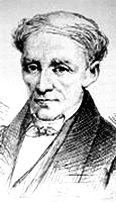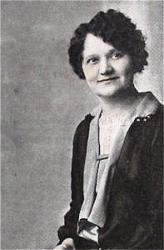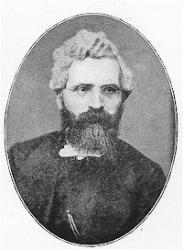
1789 - 1854 Person Name: Johann Hey Meter: 8.7.8.7.8.8.7 Author of "Can You Count the Stars?" in Praise for the Lord (Expanded Edition) Hey, Johann Wilhelm, son of H. A. Hey, pastor at Leina, near Gotha, was born at Leina, March 26, 1789. He studied at the Universities of Jena and Göttingen, became in 1811 licentiate in theology, and, after varied tutorial work, was appointed in 1818 pastor at Töttelstadt, near Gotha. In 1827 he became court preacher at Gotha, where his preaching attracted large audiences, but being regarded as a Pietist, was in 1832 appointed superintendent of Ichtershausen. He died at Ichtershausen, May 19, 1854 (Koch, vii. 262-266; Allgemeine Deutsche Biographie, xii. 344-345; MS. from Pfarrer Ortlob of Leina).
Hey's poems were mostly written for children. The best known are his Fabeln für Kinder, with illustrations by Otto Speckter, of which the first fifty appeared at Hamburg, 1833, the second fifty in 1837. Since then they have passed through a large number of editions in German, and have been several times translated into English. At the end of each series is a "Serious Appendix," containing religious and moral songs. The whole of these two Appendices have been translated into English as Hymns and Poems for Little Children. Translated from the German. London, 1853. Also in the Fifty Fables, 1867, and Other Fifty Fables, 1869, translated by Sophie Klingemann, and published by F. A. Perthes at Gotha.
Very few of Hey's hymns are suited for Church use. Those which we have to note are:—
I. Hymns for Church Use.
i. Wenn auch vor deiner Thür eimnal. Christian Charity. First published in Knapp's Christoterpe, 1835, p. 68, in 9 stanzas of 4 lines, as the fifth hymn of a series on the words "Behold I stand at the door and knock," Rev. iii. 20. In Knapp's Evangelischer Lieder-Schatz, 1837, No. 2412 (1865, No. 2146), it was altered to "Christ! wenn die Armen manchesmal," and this form passed into the Württemberg Gesang-Buch 1842, and other recent collections. The only translation is, "Ah, Christian! if the needy poor," by Mrs. Findlater, in Hymns from the Land of Luther, 3rd Ser, 1858, p. 30 (1884, p. 152).
ii. Wenn je du wieder zagst. Passiontide. On Christ in the Garden of Gethsemane. First published in Severin Vater's Jahrbuch für häusliche Andacht, Gotha, 1824, p. 173, as No. 9 of the "Reminiscences of the sufferings of Jesus; for the Quiet Days of the week before Easter," in 9 stanzas of 8 lines, with the motto "Not my will, but Thine be done." Included in Bunsen's Versuch, 1833; Knapp's Evangelischer Lieder-Schatz, 1850 and 1865, &c.
Translated as:—
Whene'er again thou sinkest. A good and full translation by Miss Winkworth in her Lyra Germanica, 2nd Ser., 1858, p. 26, and repeated, abridged, in Psalms & Hymns, Bedford, 1864, and in Holy Song, 1869.
II. Hymns for Children.
All those to be noted appeared in the Appendix to the 2nd Series of his Fabeln für Kinder, Hamburg, 1837.
iii. Alle Jahre wieder, kommt das Christus Kind. Christmas. 1837, p. 31, in 3 st. The translations are: (1) "The blessed feast of Christmas," in Hymns & Poems, 1853, p. 81. (2) "Every year that endeth," by Sophie Klingemann, 1869, p. 31. (3) "As each happy Christmas," by Mrs. H. K. Spaeth, as No. 33 in the Little Children's Book, Philadelphia, 1885.
iv. Aus dem Himmel ferne. God our Father. 1837, p. 7, in 4 stanzas. The translations are: (1) "From the glorious heav'n above," in Hymns & Poems, 1853, p. 49. (2) "From the glorious heaven," by Mrs. Sevan, 1859, p. 139. (3) “From the angels' dwelling," in Dr. F. Silcher's Song Book for the Young, Nelson, 1868, No. 1. (4) "From His heaven above," by Sophie Klingemann, 1869, p. 7. (5) "From the far blue heaven," as No. 676, in the Tribute of Praise, Boston, U.S., 1873.
v. Glöcklein klingt, Vöglein singt. Thanksgiving. 1837, p. 17 (in the ed. 1886, n.d., as part of Sonnentchein, Sternelein),in 5 stanzas. The translations are: (1) "The bells they ring, The birds they sing," in Hymns & Poems, 1853, p. 63. (2) "Bells do ring, birds do sing," in Silcher's Song Book, 1868, No. 9. (3) "Bells are ringing, Birds are singing," by Sophie Klingemann, 1869, p. 17. (4) "Church bells ring," by Mrs. H. R. Spaeth, in Little Children's Book 1885, No. 72.
vi. Weisst du wie viel Sternlein stehen. God's care of His creatures. 1837, p. 20, in 3 stanzas. The translations are: (1) "Canst thou sum up each brilliant star." In Hymns & Poems, 1853, p. 67. (2) "How many stars are shining," by Mrs. Bevan, 1859, p. 144. (3) "Can you tell the countless number," by Sophie Klingemann, 1869, p. 20. (4) "Canst thou count the stars that twinkle," in the Rev. C. S. Bere's Children's Choral Book, 1869, p. 4, repeated as No. 425 in the Universal Hymn Book,1885.
vii. Wen Jesus liebt Der kann allein. Love of Christ. 1837, p. 37, in 4 stanzas. The translations are: (1) "They who love Jesus alone can be gay," in Hymns & Poems, 1853, p. 90. (2) "The love of Christ makes ever glad," by Sophie Klingemann, 1869, p. 37. (3) "Whom Jesus loves," by Mrs. H. R. Spaeth, in Service & Hymns for Sunday Schools (Southern Lutheran), Philadelphia, 1883, p. 178. (4) "Whom Christ holds dear," by Prof. M. H. Richards, as No. 98 in the Little Children's Book, Philadelphia, 1885. [Rev. James Mearns, M.A.]
--John Julian, Dictionary of Hymnology (1907)
Wilhelm Hey


 My Starred Hymns
My Starred Hymns








